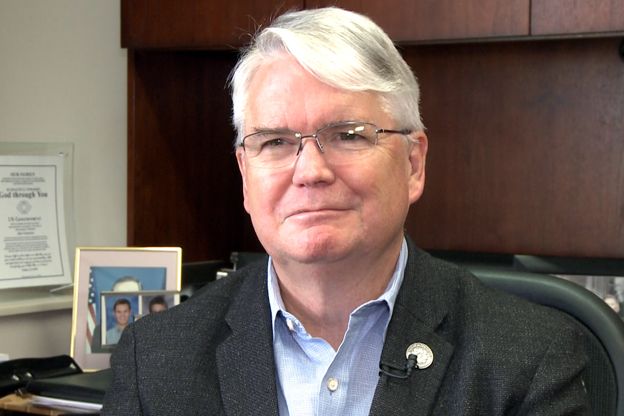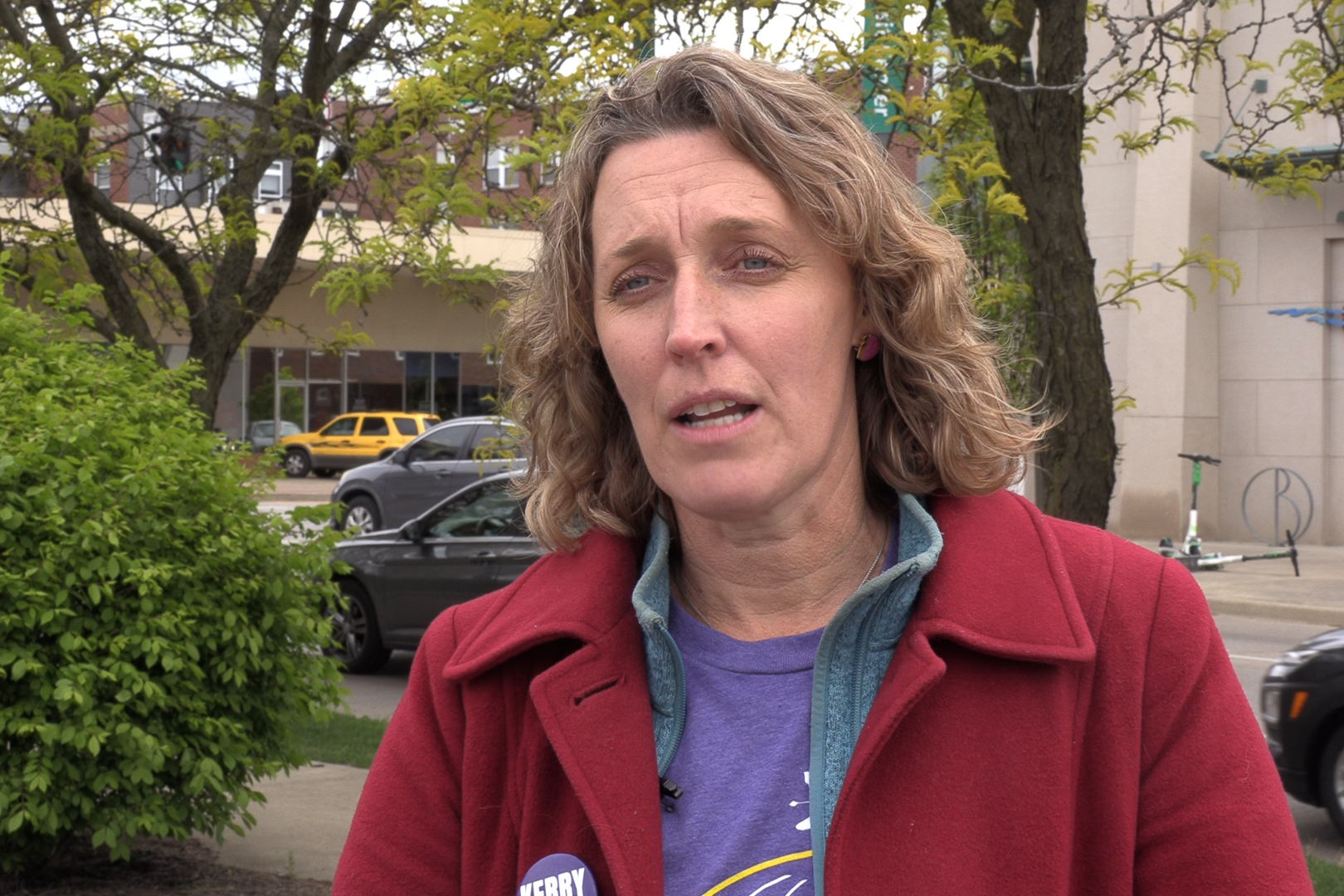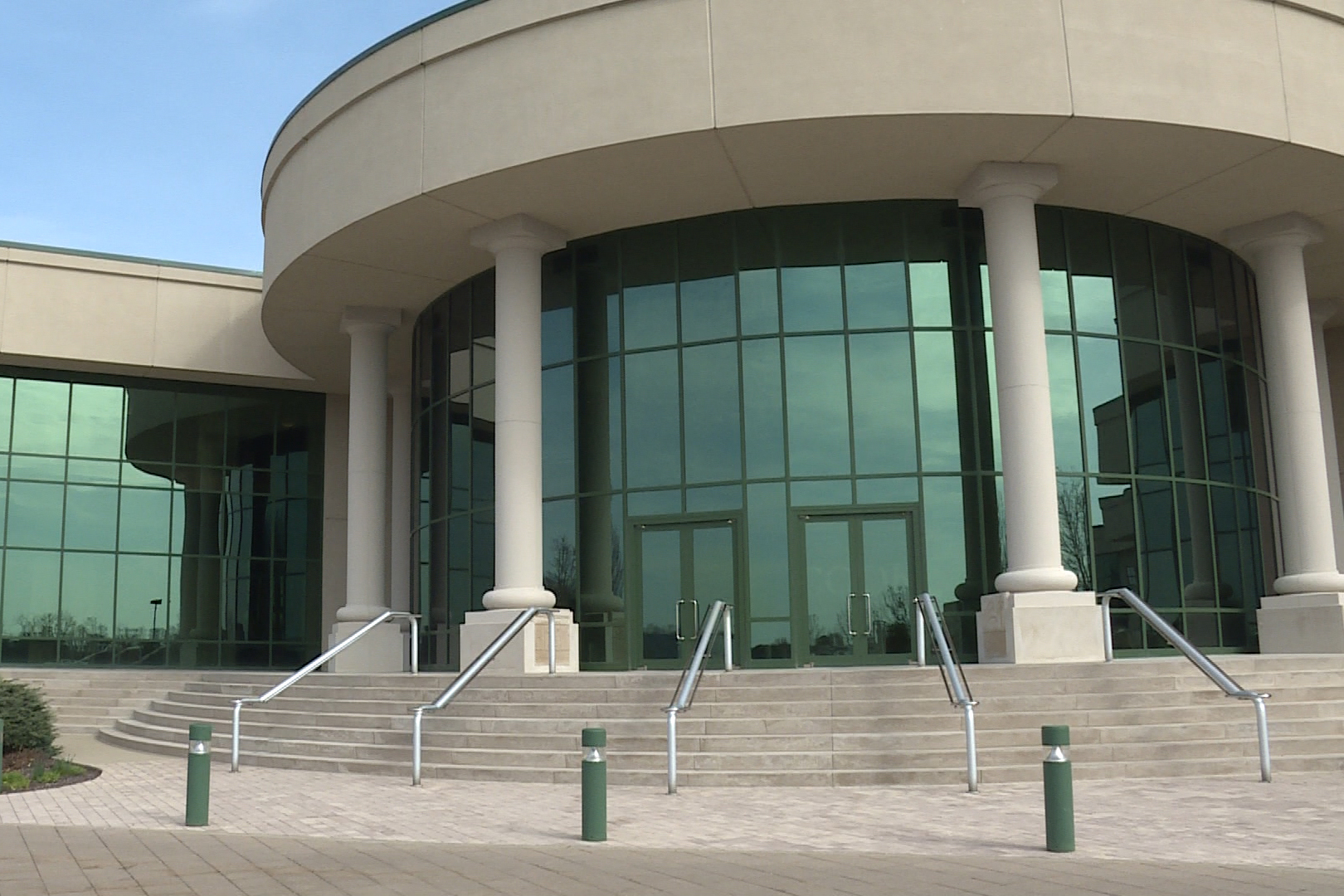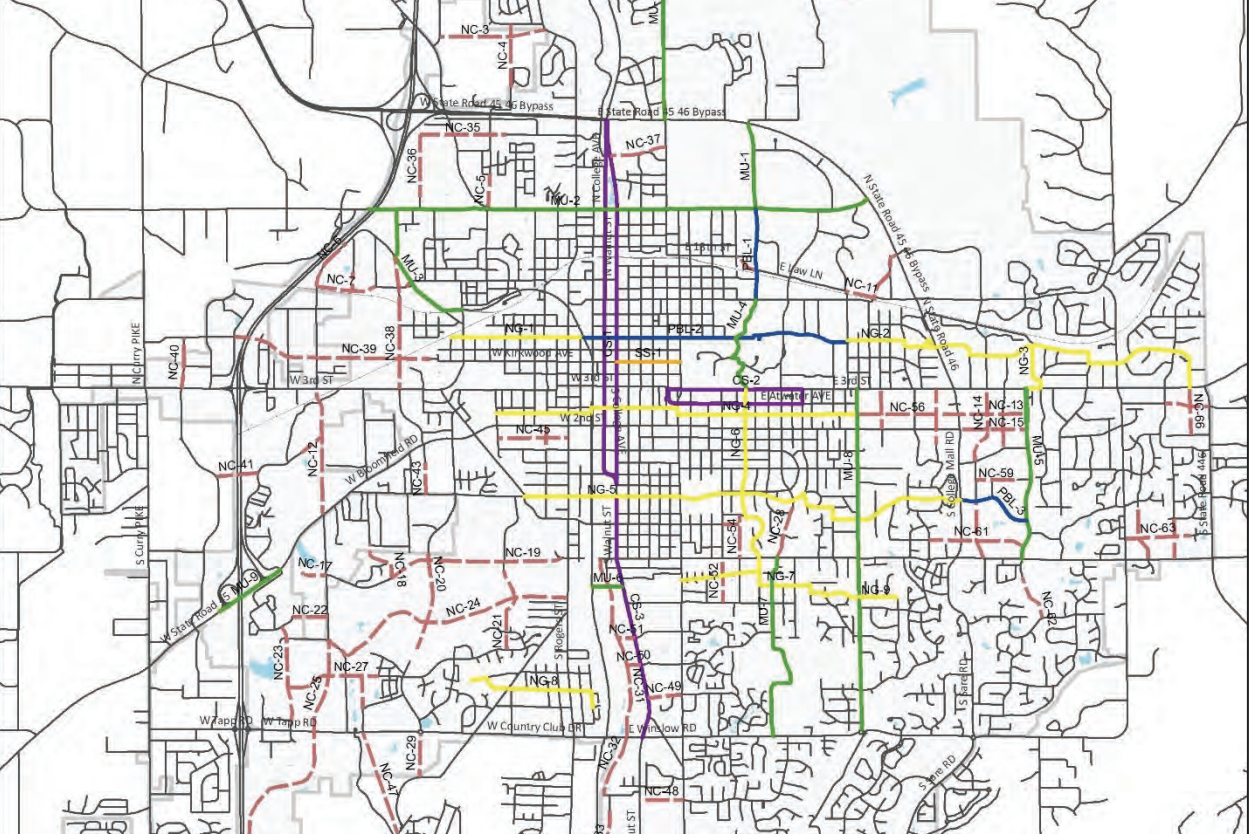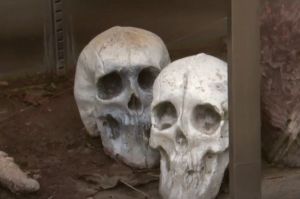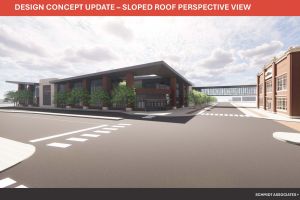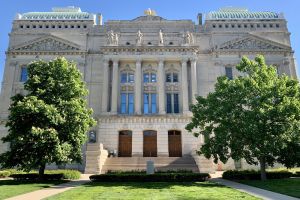Okay, this is Ask the mayor on WFIU I'm Joe Hren third Wednesday of the month and we're here with Bloomington's John Hamilton. Hello, welcome. Thanks for having us today.
Unknown Speaker
Joe, always good to be with you. Thanks for being here.
Speaker 1
We're at City Hall, you can submit questions at news at Indiana public media.org. Or at Ask the mayor on Twitter primary election is over. course you're not running. So we know we're going to have a new mayor, but a lot of new city council members as well. How do you feel about the outcome of the election?
Speaker 2
Well, you know, it was different. I hadn't not having a role in this one the same way. So that was watching from the sidelines. But I it was more turnout than the last time I ran. So that was good to see. And we still need to see more people getting out to vote in municipal elections, but a couple 1000 more. So that was good. And as you indicated, the big shift is probably five new council members, at least. And I think they'll be younger, more diverse than we've ever had in our council history. And that's a terrific thing. A lot of new talent, good people and of course, the new mayor. There the election is not till November, and we'll see if the Republicans feel the candidate for that. But right now, we're pointed toward a few a few more months of campaigning, but the intense primaries over.
Speaker 1
Okay, well, let's just get to the news coming from Cook Medical cutting 500 jobs about 123 in Indiana. Thought I heard maybe 60 or 70. in Bloomington. We saw this with Katelyn to laying off 400 jobs last November. So is this a trend that we're seeing here?
Speaker 2
Well, let's hope not Joe, you know, there's there's always churn in in our employment markets. I mean, one of the things I always remind people when you hear a stat tist ik that says the economy added 200,000 jobs last month, that's not actually true. What actually happened is the economy added something like 3 million jobs and lost 2.8 million jobs. I mean, there's always churn. You know, overall, we've seen a lot of job growth in the area with Katelyn with Cook, other employers, new employers, but you know, we're concerned about that. I think big companies like Katelyn and cook can go through transitions. We know what Katelyn, they had to change in the immunization and the vaccine that they were doing. The world has changed a lot since the pandemic. So I haven't gotten a chance to talk to CEO young men yet I will expect to do that soon. But, you know, we want to work with them. We're confident there are 1000s of employees that will be active here. But you know, it's tricky to see a company have to trim its sails a little bit like that.
Speaker 1
Is this part of a changing economy that that's happening in Bloomington? And is that something that the city also has to change to?
Speaker 2
Well, it's hard to read too much into one announcement like that. I think, Joe, our economy is changing, like the economies around the country. We are seeing more technology, high tech, artificial intelligence coding, we're seeing more science, if you will, cabling, you know, just looking at crane and the employment down in crane and the growth in in battery technology, for example, one area or we're seeing a growth in Indiana, which will affect us, I think and chip and energy economy. So yes, things are changing. Now we have a concentration of a lot of health care companies here like cook and catalent and Baxter and five Boston Scientific for big companies on this area. Their world is going to keep changing, but we're going to need their products I think for a long, long time.
Speaker 1
Well, and you just mentioned Baxter, who sold their Bloomington Yeah, company to just recently is that concerning that those jobs could be on the chopping block?
Speaker 2
Well, yes, we're always watching that. But uh, you know, remind you cook farmaco was sold to Katelyn five or six years ago for a billion dollars with 750 employees. They now have 3000 employees here in the area. So those kinds of transactions we want to watch and work with them. But you know, from a mayor seat, the most important thing you can do, I think, is trying to make sure you have a great city, high quality of life, a wonderful place to be good schools, great parks, great, great living conditions, and that's what we focus on and I think then the economy will kind of take care of itself.
Speaker 1
We were talking with Terre Haute, Mayor Duke Bennett on the previous show Vigo county really happy about getting a huge manufacturer of electric batteries. You mentioned batteries. So one and a half billion dollar investment or 640 employees. Can Bloomington attract or attract or try to maintain those type of two.
Speaker 2
Yes, absolutely. Joe, you know, we big big hits like that are important and you know can Once an example of that here and but I do think in the long run, what you really look for is growing your economy from the bottom up with new new companies, expanding companies, yes, we'll get locations I'm sure we will. The highway interstate will make a little difference to Bloomington. I think in the coming years, we would expect to see some in the trades district and you know, some along the highway I think will happen. But landing one or two of those is is helpful. But it's not really the chart of our future. We want to have great schools. We want to have growing companies like we're growing out of the mill, we want to have our existing companies growing and I do expect with the chips act and with you know what Indiana generally is seeing I think Bloomington will see as well.
Speaker 1
Was something recently just covered the city Animal Control Commission wants to the Council to approve a proposed ban on deer feeding a no doubt to limit increase in Deer has been such a topic here, hasn't it over the years. But I read in our report, city council has yet to receive a formal proposal. I think I believe it's on your desk, and maybe the city legal department. So do you have an update on that?
Speaker 2
Well, Joe, they don't really need us formal proposal. I mean, the animal commission made that recommendation and any council member can bring forward a piece of legislation and will encourage him to do so I think I will be looking at it. And I think it's very appropriate to do will support it. I'm confident if they they don't really need us to write the legislation, but we can you know, we can work with them on that. And I appreciate that. All the members of the animal commission who've been doing hard work and good thinking about this issue.
Speaker 1
Is there a city lead group on the urban deer issue?
Speaker 2
A like a taskforce? Yeah, like that. Yeah, really, the animal commission
Unknown Speaker
is surveying. They do that.
Speaker 2
Okay. Now there. We did used to have before I was mayor, there was a deer taskforce that made the recommendations about Griffey, like preserve and about urban deer. And I basically followed those they were science based, but not since then. It's really migrated into the more general question of animal control.
Speaker 1
And I I saw were about 60 complaints about deer mainly, I think it was a se. Se is that still a concern or something that the city? Well, we we
Speaker 2
do see we have concerns. It is not good to feed deer, we've recommended that people not to do that. So putting an ordinance in effect to maybe helpful to enforce that. The science tells us urban deer are very happy. They have a good life compared to life outside the environs of our city. But it does cause stress, it causes stress with traffic and causes stress with people's gardens. But we really think it's kind of a neighborhood by neighborhood issue. From my perspective, it's not a currently a health issue, basically, or a big science. Science tells us, Hey, these are animals that are feeding on what you've got around you.
Speaker 1
I want to get a little bit about the corridor study, because we're starting to report on that a little bit more and includes walnut and, and College Avenue. Most of what people catches people's attention, of course, is turning those two main thoroughfares into two way streets are now one way streets. Do you have any update on what's going on with Don't
Speaker 2
get ahead of us now? turning them into we do not know. Yeah, one of the issues is to study that question. And that was a recommendation from some work a couple years ago, doing a corridor study for main arteries like that is important to do every once in a while. We haven't done it for quite a number of years. And it's really to look at the physical layout of the of the roadways. How do people navigate them pedestrians, bicyclists, cars, buses, emergency vehicles, commerce, all that stuff. And we want a lot of public input. It will the study will consider Do we like the one way alignment of those streets or would two way make sense there? Definitely cities around the state and around the country that have switched from one way which is primarily to help move vehicular traffic to two way which is primarily to try to activate the streets and the streetscapes more, but it's a big question. I doubt if it'll be decided while I'm in this seat. But it will be studied and recommendations and ultimately, that's the City Council vote determination of that.
Speaker 1
But the initial there was an initial contract with as a tool design group that did recommend that
Speaker 2
they recommended considering it and studying it and saying it's been successful in other places. As I said, I do you know, it's worth looking at that question because one way streets again, are meant to move vehicles as quickly as possible. Is that what we want? That'll be The the question for the for the city to decide.
Speaker 1
So what what else is being looked at? Because I know it's a corridor study, but I think we talked about this maybe even a year ago or a while ago. And I remember you saying this is this is a much bigger study,
Speaker 2
you really look and I'm not an expert on this, but you look at things like, for example, curb cuts, how many curb cuts are there, you know, that have developed over time you look at sidewalk placement, you look at bike lanes, you look at buses, you know, we're going to be looking at a bus rapid transit on the Third Street, East West Line, as you know, it may be worth looking at that on a north south basis, too. So you, you really look at all those kind of mobility questions. And then you also I think, look at well, do you want more sidewalk cafes? Do you want? What's your streetscape look like? You know, do we want to have? And how do we extend the downtown rules farther south? Or how does it change? You know, it's it's a quarter that goes through a lot of different areas.
Speaker 1
And there's public input to they're having what is it walking strolls or talking strollers?
Speaker 2
Yeah, we we love. Our department will help people, either individually or in groups, kind of walk along and get get feedback, as well as just general feedback. If you don't want to walk and walk and talk with us, you can just go online, but we hope to get a lot of input from that, including all the people who own property along there who patronize businesses there and used to use that quarter.
Speaker 1
And a quick update on the lower cascades road closure proposal.
Speaker 2
No, that's I hope we'll go to council soon. We don't have a date for that yet.
Speaker 1
And how about an update on the police fire department headquarters to city hall here?
Speaker 2
Yeah, you know, Joe, that's kind of one of those things where it's big, it's a big thing is $32 million plus project and then it kind of gets quiet for a while because the architects are turning and sharpening their pencils. We're doing a big redo of showers West, we now call that which will be the police headquarters, plus three significant fire department buildings. So the architects are really busy. We'll start to see some action on that yet this year, I think.
Speaker 1
What else? I always like to leave the last any big announcements? Well, you know,
Speaker 2
one thing that's happening this week is kind of exciting at our water utility, which is they're unveiling a major report, Joe that has looked at can we change our process or at a process technically for what's called anaerobic digestion, digestion, not in the presence of oxygen, to basically create a giant composter that would take feedstock from not only our community, but even miles and miles around and turn it into clean energy, and use that energy to run the plant. We've been studying this for years. It's a big report, I've seen it. It's recommending 10s of millions of dollars that can invest and pay itself off probably over time and make our that's the single biggest electric user in our county wastewater plant and turn it into a net zero energy potentially. So this week, there's going to be a presentation of that. I hope there'll be a lot of discussion about that, too.
Unknown Speaker
Wow. Is that open to the puppet
Speaker 2
public meeting? I it's I think it's Wednesday night. And it could be Thursday night, Joe, I'll have to check.
Speaker 1
Yeah, and we can look that up and put it in a link on this podcast. But
Speaker 2
it'll it's a really big opportunity for our community. And I'm excited about it. And some of these are, you know, these are infrastructure, messy, big, big investments, but they really can change the trajectory of this of this community, make us cleaner, more sustainable and help the whole area around us recycle compostable materials.
Speaker 1
And there was a press release, I think just today to what is it about violence or gun violence?
Speaker 2
Joe, we we've we've also been doing some important steps on violence and gun violence protection prevention. I had a meeting last week with a number of the leaders who are in law enforcement, prosecution, university health issues, about what can we do about non violence? I think we're going to continue that Moms Demand Action helped us look at that. And then more generally, kind of community violence. We have a new grant program that Beverly calendar Anderson runs and is making available to neighborhoods about how just to prevent violence, working with our neighborhoods supporting them $125,000 that we want to see. How can we help get in front of this, you know, it's it's the prevalence of guns is is overwhelming. We probably have over 150,000 in our county. They're used too often. And besides just gun violence, there's other issues we want to try to get ahead of.
Speaker 1
As always, thank you so much for your time, and we'll see you next time. Thanks, Joe.







